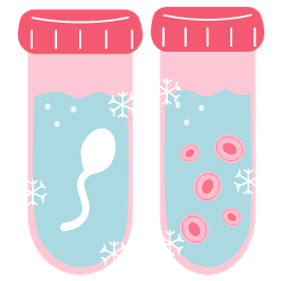Sperm Donation
Home | Services | Sperm Donation
What is Sperm Donation ?
Sperm donation is a process in which a man donates his sperm to help others have a child. This gift is usually used by couples with fertility problems, singles, or same-sex couples who want to have a child. Sperm donors are usually screened to make sure they are healthy and free of any genetic or infectious diseases. The donated sperm is then used to facilitate conception in a variety of artificial insemination methods, such as intrauterine insemination (IUI) or in vitro fertilization (IVF)
What are the benefits of Sperm Donation ?
Helping others: Donating sperm offers a significant opportunity to help individuals or couples who, for various reasons, such as infertility problems, single parenthood, or same-sex couples who want to start a family, cannot conceive naturally.
Creating families: Sperm donation offers recipients the opportunity to start a family and experience the joy of parenthood that would not otherwise be possible without the generosity of donors.
Health screening: Donors undergo extensive medical and genetic screening to ensure that the donated sperm does not have certain genetic diseases or health problems. This process promotes a healthier pregnancy and offspring.
Ethical and legal support: Sperm donation is usually carried out according to ethical guidelines and a legal framework to protect the rights and obligations of all parties, ensuring a structured and regulated process. Diversity and choice: Sperm banks often offer a variety of donors, allowing recipients to choose based on multiple criteria, such as physical characteristics, educational background, or personal preferences, and offering a variety of options.
Single parenthood and same-sex couples: This allows single parents or same-sex couples to have biological children and create families that may not be possible without donor sperm.
Variety and diversity: Sperm banks often have diverse donor lists that offer different options based on ethnicity, physical characteristics, educational background, and more. This allows parents to choose a donor that matches their preferences.
Controlled Process: Sperm donation is a controlled and regulated process that ensures legal and ethical aspects, including consent and contracts between the donor and the intended parents, are taken into account.


Frequently Asked Questions
Who can become a sperm donor ?
Typically, sperm banks have specific criteria for donors, including age limits (usually between 18 and 40), good health, absence of certain hereditary diseases, and a willingness to undergo extensive medical and genetic screening. Additionally, some banks may have height, education, or other criteria.
What is the donation process like?
Donors typically start by applying at a sperm bank or clinic. They undergo comprehensive health screenings, including physical exams, genetic testing, and interviews about personal and family medical histories. After approval, donors provide sperm samples through masturbation, which are then processed, frozen, and stored for future use in assisted reproductive procedures. To get a consultation, please visit Dr. Neelu Prasad’s IVF clinic in Patna for the best treatment and advice.
Can donors choose who receives their sperm?
Generally, donors don’t have control over specific recipients. Instead, it’s the recipients who select donors based on available information provided by the sperm bank, such as the donor’s physical characteristics, education, medical history, etc.
Is sperm donation compensated ?
Compensation practices vary by region and sperm bank. Some banks offer financial compensation or reimbursements for the time and effort involved in the donation process. However, this compensation is typically not excessive and is more about covering expenses rather than serving as a primary income source for donors.
Can donors have any involvement in the child's life?
Generally, anonymous donors do not have involvement in the child’s life. However, in cases of open donation or agreements made between the parties involved, there might be provisions for contact or communication between the donor and the child later in life.
